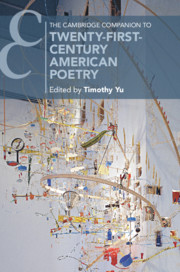Book contents
- The Cambridge Companion to Twenty-First-Century American Poetry
- The Cambridge Companion to Twenty-First-Century American Poetry
- Copyright page
- Contents
- Notes on Contributors
- Chronology
- Introduction
- 1 New Black Aesthetics: Post–Civil Rights African American Poetry
- 2 Traditions of Innovation in Asian American Poetry
- 3 Locations of Contemporary Latina/o Poetry
- 4 Sovereign Poetics and Possibilities in Indigenous Poetry
- 5 Changing Topographies, New Feminisms, and Women Poets
- 6 The Nearly Baroque in Contemporary Poetry
- 7 Disability Aesthetics and Poetic Practice
- 8 Queer Poetry and Bioethics
- 9 Trauma and the Avant-Garde
- 10 Blockade Chants and Cloud-Nets: Terminal Poetics of the Anthropocene
- 11 Give Me Poems and Give Me Death: On the End of Slam(?)
- 12 Anti-capitalist Poetry
- 13 Of Poetry and Permanent War in the Twenty-First-Century
- 14 Poetry in the Program Era
- 15 The Future of Poetry Studies
- Further Reading
- Index
- Cambridge Companions to …
- References
2 - Traditions of Innovation in Asian American Poetry
Published online by Cambridge University Press: 25 February 2021
- The Cambridge Companion to Twenty-First-Century American Poetry
- The Cambridge Companion to Twenty-First-Century American Poetry
- Copyright page
- Contents
- Notes on Contributors
- Chronology
- Introduction
- 1 New Black Aesthetics: Post–Civil Rights African American Poetry
- 2 Traditions of Innovation in Asian American Poetry
- 3 Locations of Contemporary Latina/o Poetry
- 4 Sovereign Poetics and Possibilities in Indigenous Poetry
- 5 Changing Topographies, New Feminisms, and Women Poets
- 6 The Nearly Baroque in Contemporary Poetry
- 7 Disability Aesthetics and Poetic Practice
- 8 Queer Poetry and Bioethics
- 9 Trauma and the Avant-Garde
- 10 Blockade Chants and Cloud-Nets: Terminal Poetics of the Anthropocene
- 11 Give Me Poems and Give Me Death: On the End of Slam(?)
- 12 Anti-capitalist Poetry
- 13 Of Poetry and Permanent War in the Twenty-First-Century
- 14 Poetry in the Program Era
- 15 The Future of Poetry Studies
- Further Reading
- Index
- Cambridge Companions to …
- References
Summary
A pan-Asian American poetry has been at the forefront of innovative poetics in myriad ways. This chapter foregrounds the impact the innovative legacies of the 1980s and 1990s have had on early twenty-first-century Asian American poetry. The 1980s and 1990s witnessed within Asian American letters the success of a mainstream lyricism but were also a crucial incubation period for a counter-tradition impatient with mainstream modes of poetic expression. Three major counter-modes have come to characterize some of the finest achievements of contemporary Asian American innovative poetics: a surrealist mode, pioneered by John Yau and practiced by younger poets such as Paolo Javier; a documental mode of postmodern montage, evident in the work of Theresa Hak Kyung Cha, Walter K. Lew, Myung Mi Kim, and Divya Victor; and a phenomenological mode practiced by Mei-mei Berssenbrugge and Sueyeun Juliette Lee.
- Type
- Chapter
- Information
- Publisher: Cambridge University PressPrint publication year: 2021
References
Works Cited
- 2
- Cited by

